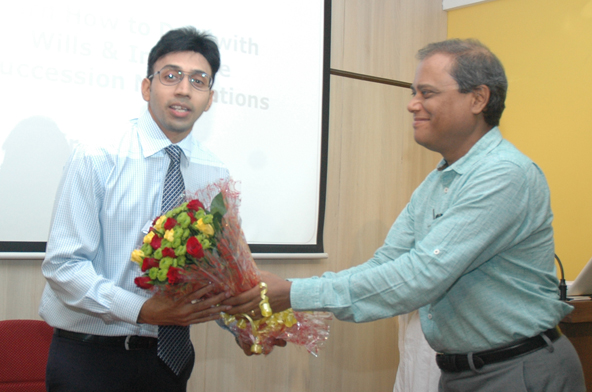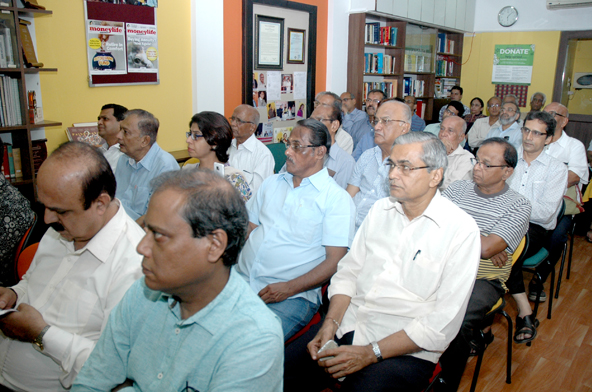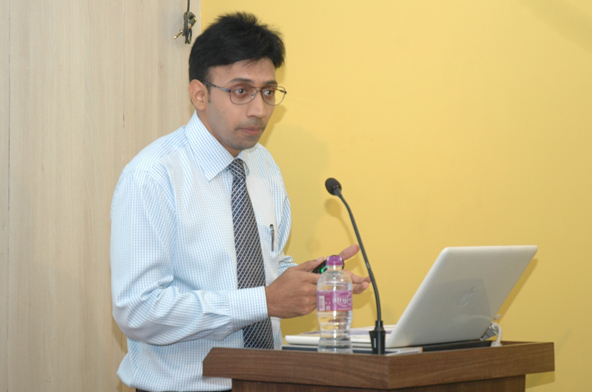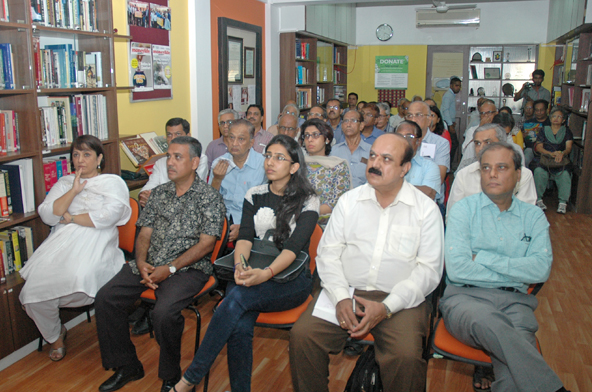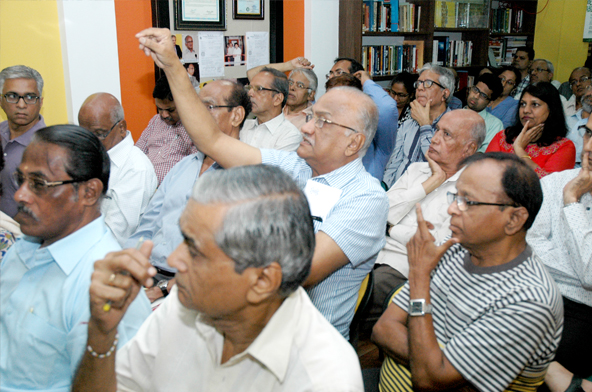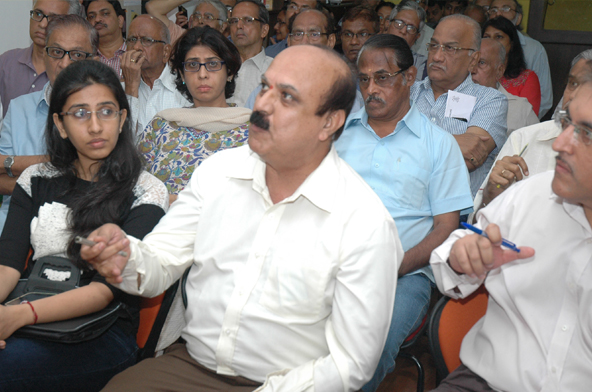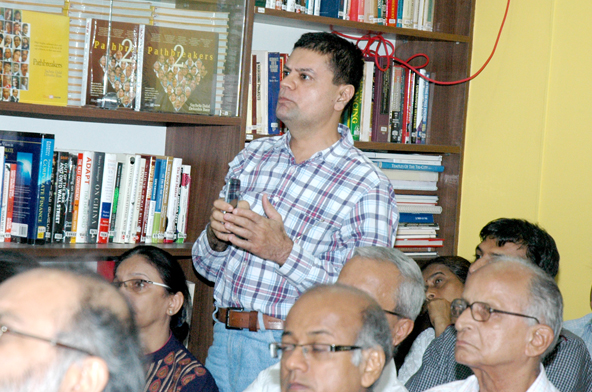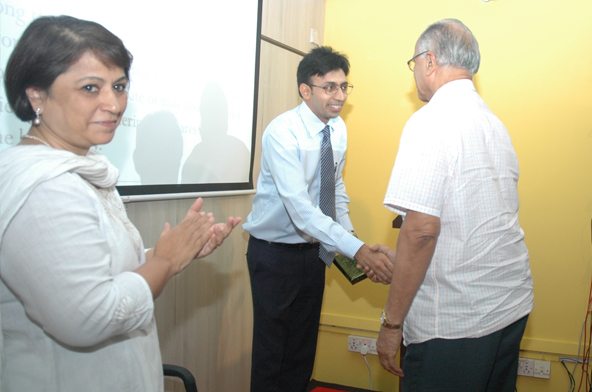
“Often when a person dies-intestate, the legal heirs have to decide how to mutually distribute the assets of the deceased.
Going to court is the least productive way. Negotiation is better and the courts are best approached only in case of a denial of one’s rights,” says Advocate Niraj Punmiya, a practitioner in the area of income and service tax. He was speaking at Moneylife Foundation on “Dealing with Wills & Intestate Succession”.
Adv Punmiya said, “Looking at how complicated and bureaucratic it is to deal with the legal and government machinery, it is better to have a clear Will to make it easy for those who come after you.”
Adv Punmiya started by explaining the basics of Wills and terms such as testator, executor, codicil, testamentary guardian; he described nine different types of Wills that are possible, but suggested that a simple Will executed by an individual was better than needless complication and complexity through joint Wills, contingent Wills etc. He pointed out that although a Will does not involve payment of stamp duty nor does it require Registration, it was highly recommended that the Will be registered.
Having taken the audience through the intricacies of the types and procedures of Wills, he turned the focus to Nominations and how it is different from a Will. Often, nominees become an important part of the whole story.
“Nomination is a Right to receive while the Will is a Right to Own” he said emphatically. A nominee is like an executor, who is entrusted to manage the property or asset as per the nominator’s wishes after his death. However, a nominee cannot sell property unless he is a legal heir,” he said.
Adv Punmiya also talked about the several procedures involved in transfer of property or other assets after the death of a nominator. Especially talking about nominations in co-operative housing society, he said, Section 30 of the Maharashtra Co-operative Societies Act, 1960, governs such matters. The Act says, “On the death of a member of a society the society shall transfer the share or interest of the deceased member to a person or persons nominated in accordance with the rules or, If no one has been nominated, to such person as may appear to the committee to be the heir or legal representative of the deceased member.”
“From interpretation of the above section, it is very clear, on the plain reading of Section 30 that the intention of the Section is to provide for who has to deal with the society on the death of the member and not to create a new rule of succession”.
Explaining this in details, especially from the society’s point of view, he said, “Society has no power, except provisionally and for a limited purpose to determine the disputes about who is the heir, or legal representative. It, therefore, follows that the provisions for transferring a share and interest to a nominee or to the heir or legal representative will be as decided by the society and is only meant to provide for interregnum between the death and the full administration of the estate and not for the purpose of conferring any permanent right of such person to a property forming part of the estate of the deceased.”
Adv Punmiya then explained succession certificate, probate as well as difference between a Will and a probate. He said, “A succession certificate establishes the authenticity of the heirs and give them the authority to inherit debts, securities and other assets that the deceased may have left behind.”
Succession certificate can be obtained from district or the High Court within whose jurisdiction, the assets fall, by filing a petition. Apart from the lawyer’s fees, the court may levy a fixed percentage of the value (up to 3%) of the estate as fee.
Usually, succession certificate takes 3-4 months (sometimes 5-7 months), if it is not contested by anyone. The succession certificate authorises the person to distribute the assets to the legal heirs as per the succession law.
“Most people think that if the succession certificate is obtained then the person is the rightful owner of the deceased person’s properties, which is not true. A succession certificate allows the person to act exactly similar to how a nominee would act. It gives the authority to the holder for distributing the deceased person’s assets. A Succession Certificate is not granted in cases where obtaining a Probate of Letter of Administration is necessary such as when there is a valid will,” Adv Punmiya said.
Succession certificate can be revoked as per Section 383 of the Indian Succession Act.
Talking about probate of a Will, he said, a probate establishes the legal character of the Executor to implement the Will and to the validity of the Will and it can be granted only to the executor appointed by the Will and the appointment may be expressed or implied.
A probate is a copy of a will certified by a court of competent jurisdiction. It proves that it is the last and final will of the deceased penned on a particular date. In the absence of a Will or nomination, succession laws come into play, he added.
Probate can be obtained from competent court under whose jurisdiction the assets are located, through a petition or application. The court may impose a percentage of assets as a fee to issue a probate. “In Maharashtra, for example, a court fee of Rs25 is payable for assets less than Rs50,000; 4% for assets between Rs50,000-Rs2 lakh, and 7.5% for assets over Rs2 lakh. There is a ceiling of Rs75,000,” Adv Punmiya said.
If the Will which is required to be probated, under the Act, if not probated, has no legal sanctity and binding force.
Explaining the difference between a Will and a probate, Adv Punmiya, said, “A probate is issued by the court, when a person dies testate i.e. having made a will and the executor or beneficiary applies to the court for grant of probate. In case a person has not made a Will, then his legal heirs will have to apply to the court for grant of a succession certificate, which will be given as per applicable laws of inheritance.”
“If there is no will or a Will does not name any executor then one needs to get the Letter of Administration,” he said, adding, “the competent authority appoints the administrator in such cases, to dispose of the property of the deceased person. It is required when the testator has failed to appoint an executor under a Will or where the executor appointed under a Will refuses to act or where executor has died before or after proving the Will but before administration of the estate. A Letter of Administration can be granted after 14 clear days from the date of death of an intestate.”
“For obtaining a letter of administration the beneficiary has to apply to the court. The court on receiving satisfactory proof of valid execution of the will issues letter of administration to the beneficiary,” he added.
Adv Punmiya then explained the practical details of distributing assets among the heirs in various ways such as gift deeds, a deed of release or transfer and transmission deeds, which bring finality to transactions without scope for ambiguity or future disputes among beneficiaries. “No sale can take place and no deed of transfer can be executed without payment of consideration. Stamp duty is payable on gift deeds, release deeds and deeds of transfer. These documents have to be stamped in accordance with the provisions of the Indian Stamp Act applicable in the state where the property is situated.
Further, as laid down in section 17 of the Registration Act, 1908, gift deeds, release deeds and deeds of transfer are all compulsorily registrable documents. Thus, on execution of any of these deeds, they have to be registered with the office of the sub-registrar of assurances within whose sub-district the whole or some portion of the property is situated, within a period of four months from the date of execution of the said document,” he concluded.
Download a copy of the important points of this talk and FAQs about Wills, nominations and Succession created by Adv Punmiya himself, here.
Also here is the link for a draft Will created by Mr Vimal Punmiya.


